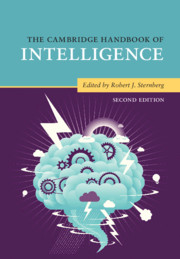Book contents
- The Cambridge Handbook of Intelligence
- The Cambridge Handbook of Intelligence
- Copyright page
- Dedication
- Contents
- Figures
- Tables
- Contributors
- Preface
- Part I Intelligence and Its Measurement
- Part II Development of Intelligence
- Part III Intelligence and Group Differences
- Part IV Biology of Intelligence
- Part V Intelligence and Information Processing
- Part VI Kinds of Intelligence
- Part VII Intelligence and Its Role in Society
- 37 Intelligence in Worldwide Perspective
- 38 Historical Evolution of Intelligence
- 39 Secular Changes in Intelligence
- 40 Society and Intelligence
- 41 Environment and Intelligence
- Part VIII Intelligence and Allied Constructs
- Part IX Folk Conceptions of Intelligence
- Part X Conclusion
- Author Index
- Subject Index
- References
38 - Historical Evolution of Intelligence
from Part VII - Intelligence and Its Role in Society
Published online by Cambridge University Press: 13 December 2019
- The Cambridge Handbook of Intelligence
- The Cambridge Handbook of Intelligence
- Copyright page
- Dedication
- Contents
- Figures
- Tables
- Contributors
- Preface
- Part I Intelligence and Its Measurement
- Part II Development of Intelligence
- Part III Intelligence and Group Differences
- Part IV Biology of Intelligence
- Part V Intelligence and Information Processing
- Part VI Kinds of Intelligence
- Part VII Intelligence and Its Role in Society
- 37 Intelligence in Worldwide Perspective
- 38 Historical Evolution of Intelligence
- 39 Secular Changes in Intelligence
- 40 Society and Intelligence
- 41 Environment and Intelligence
- Part VIII Intelligence and Allied Constructs
- Part IX Folk Conceptions of Intelligence
- Part X Conclusion
- Author Index
- Subject Index
- References
Summary
Historical change in the definition of intelligence has a globalized direction under the influence of sociodemographic change. The main sociodemographic shifts are ever more technology, urbanization, formal education, wealth, and commercialized economies. Under the influence of these sociodemographic shifts, the direction of change in valued intelligence is from the integration of social responsibility, wisdom, and spirituality with cognitive intelligence toward purely cognitive skills; from practical, detailed, and contextualized to abstract, decontextualized cognition; from slow and careful thinking to speeded cognition; from repetition of the known to extrapolation and novelty; from habitual practice to innovation; and, using the language of IQ tests, from crystallized to fluid intelligence. These changes in definition have taken place and continue to take place around the world. While shifts in the definition of intelligence may be more visible in fast-changing societies, they have also taken place in the United States, as seen most dramatically in “what the IQ tests measure.”
Keywords
- Type
- Chapter
- Information
- The Cambridge Handbook of Intelligence , pp. 916 - 939Publisher: Cambridge University PressPrint publication year: 2020
References
- 3
- Cited by

